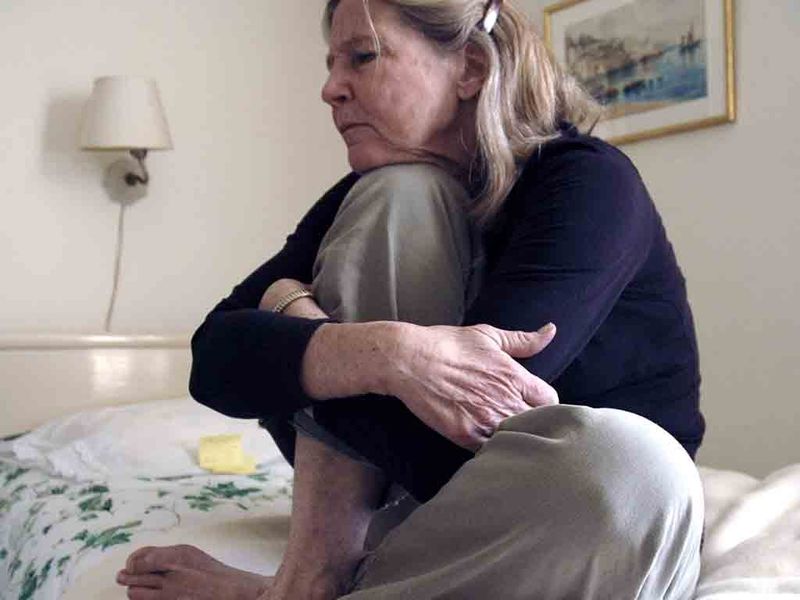18 Ways Empty Nest Syndrome Can Create Unexpected Marital Tension
Empty Nest Syndrome often brings a wave of emotional and relational changes for couples. The departure of children can leave a vacuum that exposes unforeseen marital tensions.
Couples may experience a sense of disconnection, confusion, and rediscovery as they navigate this new phase of life. As the house grows quieter, couples are left to re-examine their relationship, sometimes uncovering unresolved issues.
Here are 18 ways Empty Nest Syndrome can unexpectedly create marital tension, each delving into emotional, identity-based, and relational shifts.
1. When the Kids Leave and the Marriage Gets Complicated

The silence that follows when children leave the nest often feels more like an echo than a relief. Couples might find themselves unprepared for the emotional void, realizing how much of their daily conversations revolved around their children. Suddenly, they are faced with the core of their relationship, and the complexities that were once obscured by parenting duties become glaringly evident.
With the kids gone, the structure that dictated their lives dissipates, leaving behind a sense of uncertainty. Some couples may struggle to fill this gap, leading to miscommunications and misunderstandings. This transitional phase invites reflection on their relationship’s foundation and whether it can withstand the absence of the children.
The challenge lies in rediscovering each other beyond the roles of parents, embracing the complexities of their partnership, and finding new ways to connect. This period requires patience and a willingness to explore the relationship anew.
2. You realize how little you’ve been talking about you two

Amidst the hustle and bustle of raising children, couples often unknowingly neglect their personal relationship. The realization that conversations have been predominantly child-focused can be startling. Rediscovering communication with each other, beyond logistical planning, becomes crucial.
This lack of couple-centric dialogue can create a sense of alienation. Couples might find themselves struggling to engage in conversations that don’t revolve around their kids. It becomes essential to develop new topics of interest, fostering deeper dialogues that rekindle their bond.
The journey involves consciously choosing to engage with each other, understanding personal growth that has occurred over the years, and nurturing a renewed partnership. This rediscovery can be both challenging and rewarding, prompting couples to re-evaluate their communication styles and adapt to the new dynamics of their relationship.
3. The house feels quiet—and not in a peaceful way

The newfound silence after the children have left can feel unsettling rather than serene. For many, the bustling noise of family life provided comfort and a sense of purpose. Now, the quiet may amplify feelings of loneliness and disconnection.
Couples must navigate this change by finding solace in each other’s company. Instead of being a source of peace, the silence can become a backdrop for unresolved issues to surface. It’s an opportunity to address these feelings, transforming the quiet into a space for growth.
Embracing new routines and shared activities can help fill the void. Whether it’s cooking together or taking up a new hobby, these efforts can redefine the household atmosphere. Adapting to this silence requires creativity and mutual support, encouraging couples to explore their relationship in the absence of family noise.
4. Differences in parenting philosophy linger

Even after the kids leave, divergent parenting philosophies can linger, affecting the couple’s harmony. These differences might have been manageable during active parenting but can now become points of contention, resurfacing during discussions about family dynamics and future expectations.
The challenge is to see these differences as opportunities for growth rather than division. Discussing these philosophies without the immediate pressure of parenting can allow for deeper understanding and acceptance. It’s crucial for couples to navigate these differences with empathy and openness.
This phase offers a chance to reflect on shared values and how they wish to apply them in future family interactions. By addressing these lingering differences, couples can strengthen their partnership, fostering a collaborative approach to their evolving family roles.
5. You mourn the role you built your identity around

For many, the identity of being a parent is deeply ingrained. When the children move out, there’s a profound sense of loss as the roles that once defined them shift drastically. This identity crisis can lead to feelings of emptiness and confusion.
Couples might find themselves navigating this mourning period together, each experiencing it in their unique way. It’s an opportunity to rediscover personal identities beyond parenthood, fostering individual growth while supporting each other’s journey.
This period of adjustment calls for patience and understanding. Embracing new roles and interests can lead to a stronger, more balanced partnership. As couples redefine themselves, they can cultivate a renewed sense of self, contributing positively to the relationship.
6. One partner wants to reconnect, the other wants space

The transition to an empty nest can highlight differing emotional needs within a relationship. One partner might yearn for closeness and connection, while the other seeks solitude and personal space. This divergence can lead to tension if not addressed openly.
Understanding each other’s needs is crucial during this phase. Open communication about these desires can help bridge the gap, preventing misunderstandings. Finding a balance between togetherness and individuality is key to maintaining a healthy relationship.
Couples can benefit from setting boundaries that respect both partners’ needs while finding ways to reconnect. Whether through planned activities or quiet evenings together, acknowledging and accommodating each other’s preferences fosters harmony and mutual respect.
7. Hobbies don’t align like they used to

When parenting responsibilities fade, hobbies and interests often change focus. Couples might discover that their once-shared activities no longer align, leading to feelings of disconnection. Embracing these changes can become a journey of rediscovering mutual interests or cultivating new ones.
This shift doesn’t have to signify growing apart; rather, it can foster individual growth and open opportunities for shared exploration. Encouragement and support for each other’s passions can bring about renewed appreciation and understanding.
Rediscovering hobbies that excite both partners or introducing each other to new ones can reinvigorate the relationship. This phase offers the chance to deepen bonds through shared experiences, creating lasting memories beyond parenting roles.
8. Retirement and empty nest hit at the same time—double shift

For some, the empty nest coincides with retirement, creating a double shift in lifestyle and identity. The simultaneous departure of children and cessation of work can feel overwhelming, requiring a complete reevaluation of daily life and purpose.
Couples must navigate these changes together, redefining their relationship and goals. This period requires adaptability and open-mindedness as they explore new roles and opportunities. Supporting each other through this transition is crucial for maintaining harmony.
Turning this double shift into a time of growth involves setting new goals, discovering shared interests, and embracing a slower pace of life. Together, couples can build a fulfilling and meaningful life beyond the boundaries of work and parenting, finding joy in shared experiences and newfound freedom.
9. Grief gets misread as disinterest

The grief of an empty nest can sometimes be misinterpreted as disinterest in the relationship. The loss of daily interactions with children might manifest as withdrawal, creating feelings of neglect or misunderstanding between partners.
Recognizing the difference between grief and disinterest is essential. Open conversations about these emotions can prevent misinterpretations. Understanding and supporting each other’s grieving process fosters empathy and kindness within the relationship.
By acknowledging these feelings, couples can work through them together, offering comfort and reassurance. This understanding helps transform grief into a shared journey toward healing and reconnection, strengthening the relationship in the process.
10. You start to wonder what you still have in common

As children leave, couples might begin questioning what binds them together beyond parenting. The realization that much of their connection centered around children can be disconcerting, prompting introspection.
This questioning phase isn’t necessarily negative; it offers a chance to explore deeper aspects of the relationship. Rediscovering shared values, interests, and dreams can reignite passion and purpose, fostering a renewed sense of unity.
Engaging in new activities together and revisiting old favorites can reveal commonalities previously overshadowed by family life. By nurturing these connections, couples can rebuild a partnership based on shared experiences and mutual understanding, crafting a future that resonates with both.
11. There’s no one left to buffer your arguments

When children leave the nest, couples might realize how often kids acted as buffers during disagreements. With no one to deflect tension, arguments may become more intense or frequent, revealing unresolved issues.
This absence of a buffer can be a turning point for couples to address long-standing conflicts directly. Open, honest communication becomes essential in navigating these moments, allowing couples to express their feelings and find resolutions.
By facing these challenges together, partners can develop healthier conflict-resolution skills, strengthening their relationship. Embracing vulnerability and understanding fosters trust and connection, paving the way for a more harmonious future.
12. You notice how routines revolved around the kids—not each other

The departure of children often highlights how deeply routines revolved around them. Couples may find themselves at a loss, unsure of how to structure their days without school schedules and extracurricular activities.
This realization invites couples to redefine their daily lives, focusing on their relationship. Establishing new rituals and shared activities can bring excitement and purpose, transforming routine into a source of connection.
Exploring new routines together encourages growth and adaptability, creating a partnership that thrives beyond traditional family roles. By embracing these changes, couples can craft a lifestyle that reflects their aspirations and strengthens their bond.
13. Affection patterns that worked with kids around feel awkward now

The presence of children often dictated how affection was expressed. With their absence, couples might find these patterns feeling awkward or misplaced, leading to uncertainty about demonstrating love.
Adapting to this new phase involves redefining how affection is shown, finding comfort and authenticity in gestures that reflect the current dynamics. This shift opens opportunities for creativity and spontaneity in expressing love.
By exploring different ways to connect, couples can discover what feels genuine and fulfilling, fostering a deeper emotional bond. Embracing these changes with openness and humor can transform this awkwardness into an enriching aspect of the relationship.
14. New silence reveals old resentments

The quiet that follows an empty nest can reveal hidden resentments that were previously masked by family noise. With fewer distractions, unresolved issues may rise to the surface, demanding attention.
Acknowledging these feelings is the first step toward healing. Couples must approach these revelations with empathy and openness, allowing space for honest discussions and resolutions. This process can be uncomfortable but is essential for growth.
By addressing these resentments and understanding their origins, partners can transform silence into an opportunity for reconciliation and renewal. This journey strengthens the relationship, encouraging forgiveness and a fresh start together.
15. You redefine “home”—and not always the same way

The concept of home evolves once children leave. Couples may find their ideas of home diverging, as each partner seeks to imprint their individuality on the space. This redefinition can lead to tension if not navigated thoughtfully.
Understanding and respecting each other’s vision for the home is crucial. Open discussions about preferences and compromises can prevent conflicts, fostering a harmonious living environment that reflects both partners.
Redefining home offers a chance to explore new aesthetics and functionalities that cater to the couple’s lifestyle. This collaboration can strengthen the relationship, creating a shared sanctuary that honors both partners’ identities.
16. There’s pressure to enjoy the “freedom” you don’t feel

The expectation to embrace newfound freedom can feel burdensome when the emotions of an empty nest linger. Couples might struggle with societal pressures to enjoy this phase, leading to feelings of inadequacy or guilt.
Acknowledging that it’s okay to not feel liberated immediately is essential. Every couple navigates this transition differently, and allowing space for genuine emotions fosters acceptance and understanding.
By embracing the journey at their own pace, couples can gradually discover the joys and possibilities of this freedom. Whether through travel, hobbies, or quiet moments together, defining this freedom authentically strengthens the relationship, allowing couples to thrive in their unique way.
17. Intimacy doesn’t just bounce back—it needs intention

With children gone, couples might expect intimacy to return effortlessly. However, rekindling this aspect of the relationship requires deliberate effort and intention.
Creating an environment that fosters intimacy involves setting aside time and space for connection. Small gestures, thoughtful surprises, and shared experiences can reignite passion and closeness.
By prioritizing each other’s needs and desires, couples can rebuild this vital component of their relationship. Embracing vulnerability and communication, they craft a partnership that thrives on mutual affection and understanding, enriching their shared journey.
18. The future feels wide open—and strangely unfamiliar

As the nest empties, the future may appear vast and uncharted. The departure of children leaves couples with an open horizon, which can feel both exhilarating and daunting.
This phase invites exploration and creativity, encouraging couples to dream and plan together. The unfamiliarity of the future can be transformed into an opportunity for growth, fostering a sense of adventure and partnership.
By embracing the unknown with curiosity and support, partners can navigate this new chapter with confidence. Together, they can build a future that reflects their shared aspirations, crafting a journey that enriches their relationship and celebrates their evolution beyond parenthood.







